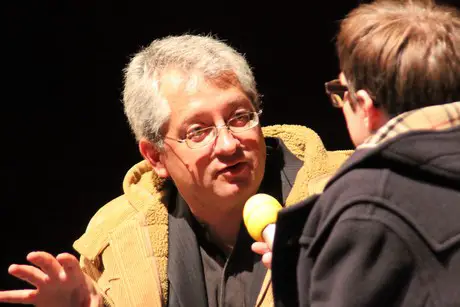Does Gratefulness Make Happy?
Brother David-Steindl-Rast on gratefulness
If you like reading about philosophy, here's a free, weekly newsletter with articles just like this one: Send it to me!
This post is part of a year-long experiment of living six theories of happiness within the space of one year. We started with Aristotle in January and February, moved to Erich Fromm in March and April, followed this up with Epicurus in May and June, and now we are examining gratefulness as a way of living our everyday lives more happily. For the rest of the year, we still want to talk about hermit lifestyles and in November and December we will talk about the Stoic life.
Brother David Steindl-Rast
David Steindl-Rast was born in Vienna in 1926, and, after studying at the Vienna Academy of Fine Arts, got a PhD in experimental psychology. His family moved to the United States in 1952, and he became a monk in 1953. In 1966, he was tasked to study Zen and to explore avenues for Buddhist-Christian dialogue. In 1968, he became one of the founders of the Center for Spiritual Studies together with Buddhist, Hindu, Jewish and Sufi spiritual teachers.
Steindl-Rast became well-known across the Internet with his 2013 TED talk “Want to be happy? Be grateful,” in which he explained, in 14 minutes, his basic philosophy of life.
Steindl-Rast is so much associated today with the topic of gratefulness that he even got to write a chapter in the Oxford University Press volume “The Psychology of Gratitude.” Surely the editors felt that no book on gratitude could be complete without Brother David’s contribution.
Everyone wants to he happy
David Steindl-Rast begins his famous TED talk by stating that everyone wants to be happy. This is not a very surprising or original statement. Jeremy Bentham (1748-1832), the founder of utilitarianism, had already had the same insight, and the history of the same basic idea goes back to ancient Greek philosophy. Aristotle (384-322 BC), in his Nicomachean Ethics, showed that we pursue all other goods like fame, education, power and money for the sake of happiness — but we never pursue happiness for the sake of power or money; thus, Aristotle concludes, we can see that happiness is the highest good. And Epicurus, too, emphasises in his “Letter to Menoeceus”: “We call pleasure the alpha and omega of a happy life. Pleasure is our first and kindred good. It is the starting-point of every choice and of every aversion.”
But what exactly is the relationship between happiness and gratefulness? David Steindl-Rast believes that we got it wrong when we say that we are grateful because our lives are happy. He mentions cases where people who have everything may be deeply unhappy, while sometimes those who suffer misfortunes in life can be happy people. From this, Steindl-Rast concludes (somewhat illogically, one must say) that it is not happiness that causes gratefulness, but gratefulness that causes happiness.
As we said before, gratefulness is the feeling that we have when we realise that we are given a gift that we want but don’t deserve. And now Steindl-Rast asks, what is this gift that we all always receive but that we’ve never done anything to deserve? It is time, he says: all the moments that make up our lives.
Opportunity
Now this alone would not be too convincing. Our lives are not filled only with moments of pleasure and excitement. They also contain long stretches of dull office work, of meeting half-forgotten relatives one does not care about, of being in bed with the flu — and that’s if one is lucky. Some people’s lives include prison sentences, divorces, life-changing car crashes, cancer treatments and, in some places, even today, concentration camps.
What is there then to be grateful about?
It’s not the moment itself, Steindl-Rast says. It’s the opportunity that every moment presents.
We talked about this in the last post (“Grateful to No One”): the idea that everything that happens to us in life, even the worst of bad luck or malice, can be re-framed as an opportunity for us to exercise our virtues. A divorce, a car crash, even a prison sentence: all these provide ways for us to prove to ourselves as well as to the world that we are indeed able to master our lives with courage, to forgive, to be generous, to be strong. None of these qualities tend to manifest themselves as long as we’re lying safe and lazy on the sofas of our lives. These are qualities that can be shown and lived only in times of adversity: their very existence depends on the bad things that happen to us throughout our lives — and for these bad things we must, therefore, be thankful, for they are the necessary conditions of our moral flourishing.

It seems that we should only be grateful for something good done to us. But already the Stoics had seen that sometimes benefits come disguised as burdens.
And Steindl-Rast goes one step further with this thought. If every moment is an opportunity, he says, then the next moment is another opportunity. Seen in this way, there are no irretrievably “missed” opportunities. Yes, right now I might have missed the opportunity to write a viral blog post that would have made me rich and famous (perhaps). But the next moment is already upon me and in this moment I have the same opportunity all over again. As long as I breathe, one could say, I’m never going to run out of opportunities to live my life, to make something out of it, to exercise my virtues, and even to grow through my own suffering.
Stop and go
But very often, we lose sight of this simple truth. Steindl-Rast:
So his proposal is to try and create situations in which we give ourselves the opportunity to realise that we should be grateful for the things we receive without having deserved them. He recalls how he returned from Africa, from a place without running water and electricity. How he was surprised and grateful every time he turned on the light or used the water tap:
Do we deserve our lives?
Of course, it’s not only that we are missing the stickers. Our problems with acknowledging our indebtedness to the world go deeper. We expect the water to come out of the tap. We have paid for it, and if the water company messes with my tap, I’ll sue them and demand my payments back. I have made a contract with a company to make sure that those light switches actually switch the lights on. And if they do, I just get what I paid for. So I never get a feeling of gratitude from these things because, as we said earlier, gratitude (or gratefulness) are only appropriate responses to a gift that is not deserved. An exchange, money for water or money for electricity, does not trigger any feelings of gratitude: only resentment if the stuff in my house doesn’t work.

What is Gratefulness?
One could also say that gratitude is always gratitude to someone, while gratefulness emphasises what we are grateful for, even if there is nobody to be grateful to for that thing.
But this doesn’t make Steindl-Rast’s point invalid, just harder to see. Yes, I am paying for the light, but what am I paying with? Money that I got from… where? My job. And do I deserve that job? I’m doing it well, let’s assume — but what about the five others who also applied for that job and didn’t get it? What about those who are unemployed? What about all those who don’t have my education, whose parents weren’t able to send them to higher schools, who live in places in the world where no schools exist? Can I really say that they “don’t deserve” to have the lights go on when they press a switch?
In the end, if we follow the causal chains of our privilege to their ends, we always find the point at which we were given those initial gifts: the gift of having been born in a wealthy country. The gift of being born into a wealthy family. The gift of being offered an education. The gift of not having died in an accident as a child. The gift of being able to sit somewhere safe and quiet right now and read these lines, rather than, say, living in one of the many places ravaged by civil wars at this very moment. None of this is really deserved.
This week…
So let us in the coming week try and be more observant, more conscious of the many gifts we received in our lives — and those we continue to receive on a daily basis. Like Steindl-Rast did, let’s try to put a sticker on a light switch or a water tap, just to remind ourselves that there are billions of people in the world who are not given these gifts; and this is due to no fault of their own. None of us “deserved” being born into a European or US upper- or middle-class, as none of those who live out their lives begging in the streets for food “deserve” to be there.
Trying really hard to always keep this in mind will eventually make us aware of how much we have to be grateful for. And this is, according to Brother David, the surest way to true happiness.
◊ ◊ ◊

Andreas Matthias on Daily Philosophy:
Cover image: Brother David Steindl-Rast (TEDGlobal Talk in June 2013). Image from TED, YouTube screen-grab.





